One of the most common questions people have about the alcohol limit, i.e., the amount of drinking at which it is no longer legal to operate a motor vehicle, is “How many drinks can I have and still drive?” Unfortunately, there is no clear-cut answer to that question. In fact, Oklahoma law enforcement doesn’t have the answer, despite being the body that would ultimately determine your ability to safely drive.
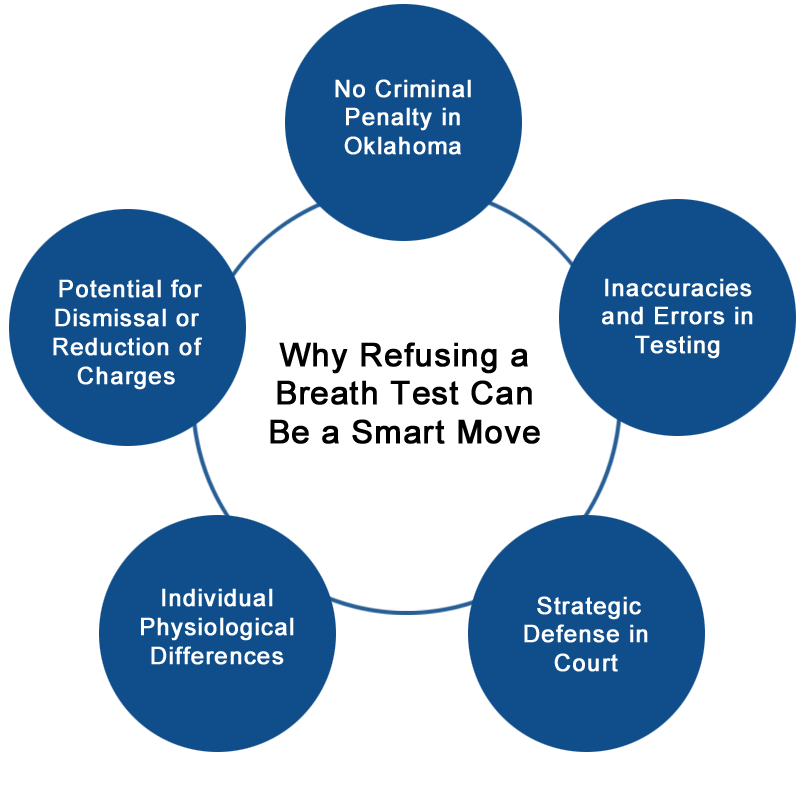 Refusing the Breath Test is Strategic
Refusing the Breath Test is Strategic
Some might mistakenly view the refusal of a breath test as an attempt to conceal guilt, presupposing that innocence equates to compliance. However, this perspective is deeply flawed.
Did you know that refusing a breath test in Oklahoma does not result in a criminal penalty?
An informed and empowered citizen recognizes that both roadside breath tests and official breath testing machines are riddled with inaccuracies, marked by a high potential for errors and false positives.
Furthermore, while refusing a breath test can potentially be portrayed in court in a negative light, most jurors will eventually learn that this test is not objective, accurate, or a reliable way to gauge if someone is impaired. The general public may not fully understand that these tests are far from perfect. Instead, they are subjective and frequently result in unwarranted accusations of impairment.
Challenging the reliability and accuracy of breath tests is not just prudent—it’s a strategic defense maneuver. Breath tests, which measure blood alcohol content (BAC), can be compromised by factors such as improper maintenance, inadequate calibration, and insufficient operator training. Moreover, these devices do not account for individual physiological differences—like health conditions, diet, body chemistry, weight, or gender—that can significantly skew results.
These tests provide mere estimates, often bordering on guesswork, without a definitive determination of intoxication. Sober individuals can, and often do, face accusations of impaired driving based on these flawed tests.
Understanding the limitations of breath tests is crucial, as it empowers individuals facing such tests to assert their right to refuse—a decision that underscores the tests’ lack of dependability. With significant consequences on the line, relying on a test known for its potential inaccuracies is not only unreasonable but also extremely risky, as it can be part of the prosecution’s evidence to try and convict you.
Challenging the breath test results is common and can usually result in a DUI charge being dismissed or reduced because the prosecution does not have enough evidence to convict. Since there are no clear answers about how much alcohol is acceptable to consume, it’s usually a better idea to refuse the breath or blood test. And yes, you do have the right in the state of Oklahoma to refuse to have your BAC tested during a traffic stop. The only legal consequences you’ll face are the revocation of your license and the possible installation of an ignition interlock device (IID). There are, however, ways to have even those sanctions waived, which we will explore as part of this guide to refusing a breath test in Oklahoma.
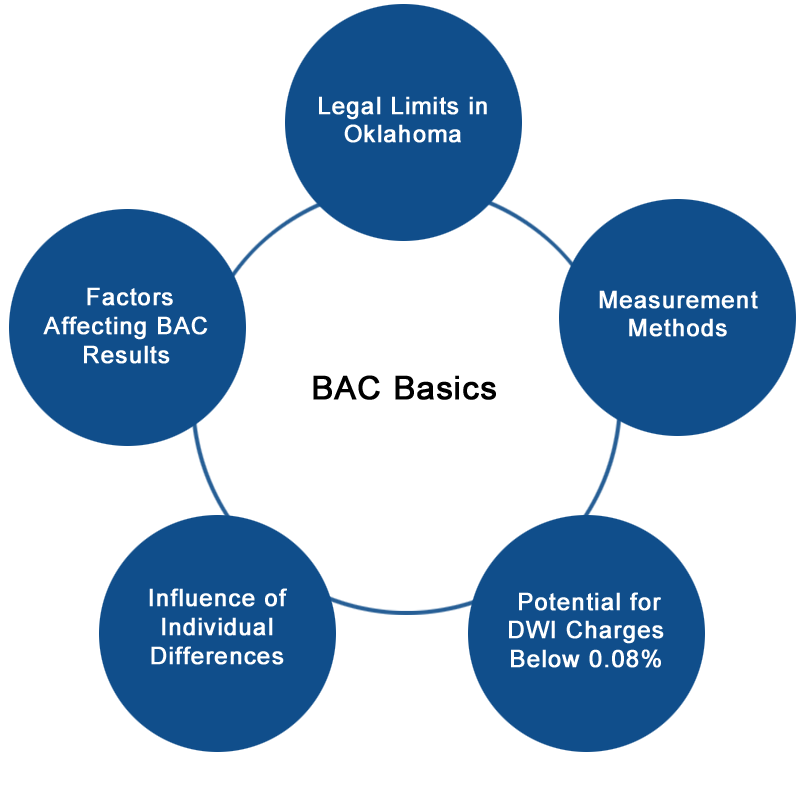 The BAC Basics
The BAC Basics
As most people know, in Oklahoma, a BAC at or above 0.08% can result in either DUI or actual physical control (APC) charges, even if the vehicle is not moving. This number essentially means that for every 100 milliliters of blood in your body, there are 80 milligrams of alcohol. BAC is generally measured by a breath test, or what many citizens refer to as a “breathalyzer,” which requires you to blow into a device that measures the amount of alcohol on your breath. Additionally, if you blow below 0.08%, you can still be charged with DWI (Driving While Impaired).
Think of the breathalyzer test as measuring your fitness level with a single exercise. Two people might run on the same treadmill at the same speed for the same duration, yet their fitness levels could appear vastly different due to factors such as age, weight, metabolism, and overall health. Similarly, two individuals taking the same breath test after consuming the same amount of alcohol can show wildly different results. These variations arise from numerous factors, including body composition, tolerance, and even the types of food consumed.
Even If You Are Below the Legal Limit, They Can Accuse You of Impairment
Not only are these tests inaccurate, but they are also at times unnecessary. Even if you consent to a breathalyzer test and show a BAC below 0.08%, you can still be charged with DUI or DWI based on the officer’s own (subjective) observations such as slurred speech or red eyes, and other clues of their discernment that you are impaired. Adding to this, certain kinds of drivers can be charged with DUI for testing below 0.08% even if not showing any signs of impairment. Commercial drivers, for example, can be charged after demonstrating a BAC of 0.04%, a level at which most people wouldn’t feel even slightly impaired. And those under 21 can be charged with DUI for showing any level of alcohol.
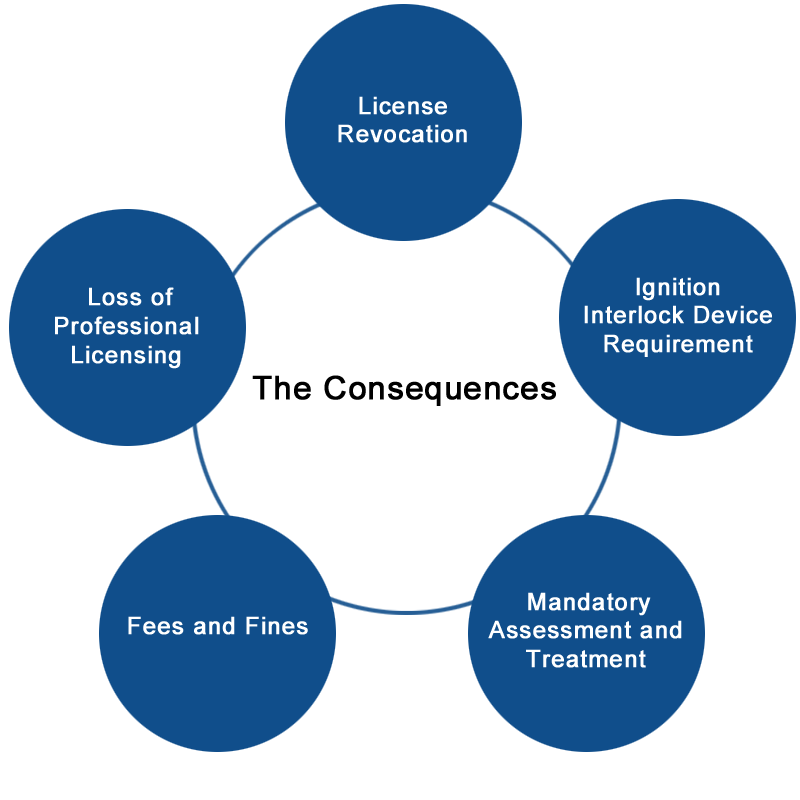 The Consequences of Refusing the Breath Test in Oklahoma
The Consequences of Refusing the Breath Test in Oklahoma
While most attorneys would recommend refusing to be tested, you no doubt have questions as to why or about the potential impacts a refusal could have. Let’s take a look at what could potentially happen to you for refusing to have your breath tested for the first time.
- Your license can be revoked. This revocation of your driving privileges can last anywhere from 6 months to two years (between 1-2 years for a second offense), severely limiting your ability to travel for work or take kids to school.
- Additionally, an ignition interlock device can be required in your vehicle. This device, which requires a clean breathalyzer test for your vehicle to start, can be a huge source of embarrassment for you and any passengers.
- You can be subjected to a mandatory assessment. A possibility for first offenders and a certainty for second offenders, this assessment will be performed by the Oklahoma Department of Mental Health and Substance Abuse Services. Based on their assessment, you may be required to attend treatment programs or rehab at your own expense.
- You can be forced to pay fees and fines. These will vary based on the circumstances of the case, ranging from $1,300 to $3,000 or more.
- You could lose professional licensing. Some professions may require that anyone who refuses a breathalyzer test surrender their license to practice that profession.
These consequences may seem harsh but are still better than a conviction of DUI, which is considered a felony for second-time offenders. All of these consequences stem from the state of Oklahoma’s implied consent laws.
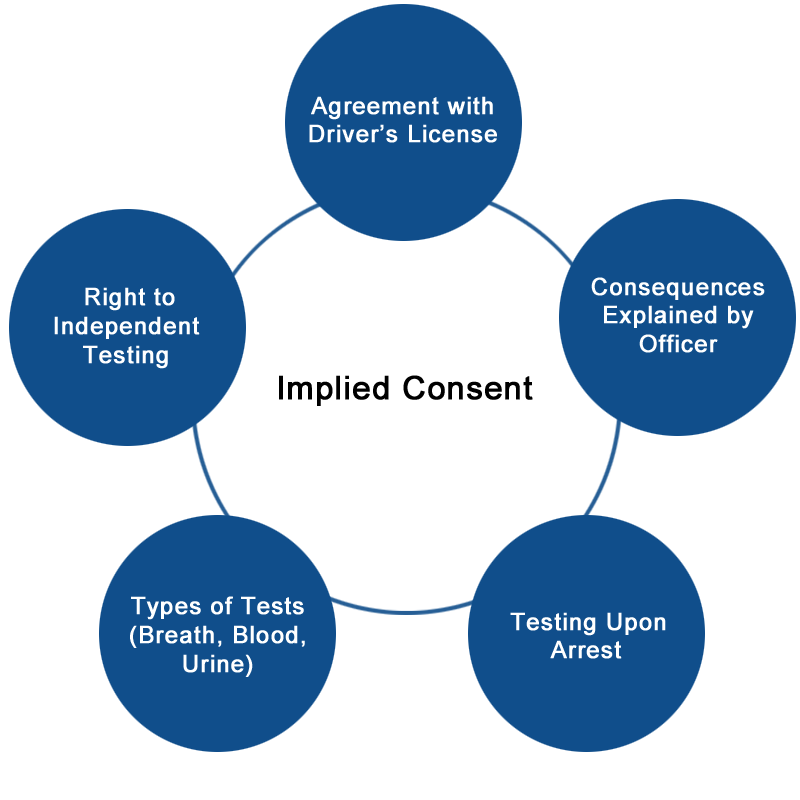 Implied Consent: What Does it Mean?
Implied Consent: What Does it Mean?
Picture yourself boarding an airplane. You are free to bring personal items, but you know there are rules about what you can carry onboard. You comply without question because you understand that by purchasing the ticket, you have implicitly agreed to the airline’s security regulations.
The State of Oklahoma has a similar approach with its Implied Consent law. When you signed up for your driver’s license, you entered into an implicit agreement that if you’re driving on Oklahoma’s roads, you consent to have your breath or blood tested if suspected of driving while impaired.
The arresting officer is required to inform you of the consequences should you decide not to be tested, but they cannot force you to.
- You have been arrested and you are requested to submit to a test or tests to determine the presence and/or concentration of intoxicants in your body.
- The test will most likely be either a breath, blood, or urine.
- Once you complete the state-administered test, you have the right to request an independent blood test at your own expense to verify or challenge the results. You must arrange and pay for this test yourself. If you are unable to obtain the test, other evidence can still be used against you in court.
- If you refuse the state’s test, your driver’s license will experience a revocation unless you request an administrative hearing within 30 days.
Roadside Breath and Official Breath Test
The results of a roadside breath test are commonly used to determine probable cause for a DUI arrest. Declining to take the roadside breath test does not equate to refusing the official breath test, but the results from the roadside test can still be used against you in various legal contexts. These include being included in police reports, probable cause affidavits, administrative hearings regarding your driver’s license, and hearings before a judge if a motion to suppress your arrest is filed. However, a skilled attorney can challenge the validity of these tests in court, arguing that they are not scientifically reliable and should be excluded from evidence.
The Official Breath Test at the Police Station
In contrast, the state’s official breath test, administered at the police station, is considered more reliable by the state and is used as evidence in DUI cases. Refusing this test is what the state will sanction you for. This test is conducted with certified equipment that should be regularly calibrated and maintained. Please note that the roadside and official breath tests can have technical issues and are far from objective. These machines routinely return errors and false positives, and the operators often make mistakes.
Deciding to Take the Breath Test or Refuse It
When deciding whether to take a breath test (blow) or refuse it at the official testing machine, both choices have serious consequences. If you blow over the legal limit or refuse the test, the officer will confiscate your driver’s license and issue an Officer’s Affidavit and Notice of Revocation/Disqualification. You will receive a 30-day temporary driving permit, and after 30 days, your license will be revoked for at least six months unless you request an administrative hearing within that time. Refusing the test can make it harder for the prosecution to prove impairment, but the penalties are similar.
If you take a breath test, you may request a second test, which will be a blood test performed at your expense. You must clearly and directly request this blood test. If you feel the breath sample does not fairly represent your level of intoxication, a blood test may be a good choice. Be aware that the second test will also be available to the government for testing and result analysis.
Forced Blood draw for Refusing the Breath Test
If you refuse the official breath test, the officer must obtain a warrant before taking a blood sample. A warrant is not always requested after a refusal; it depends on the circumstances. If there are injuries or fatalities, a warrant will likely be requested. In such cases, it is crucial to contact a defense attorney immediately to investigate the situation.
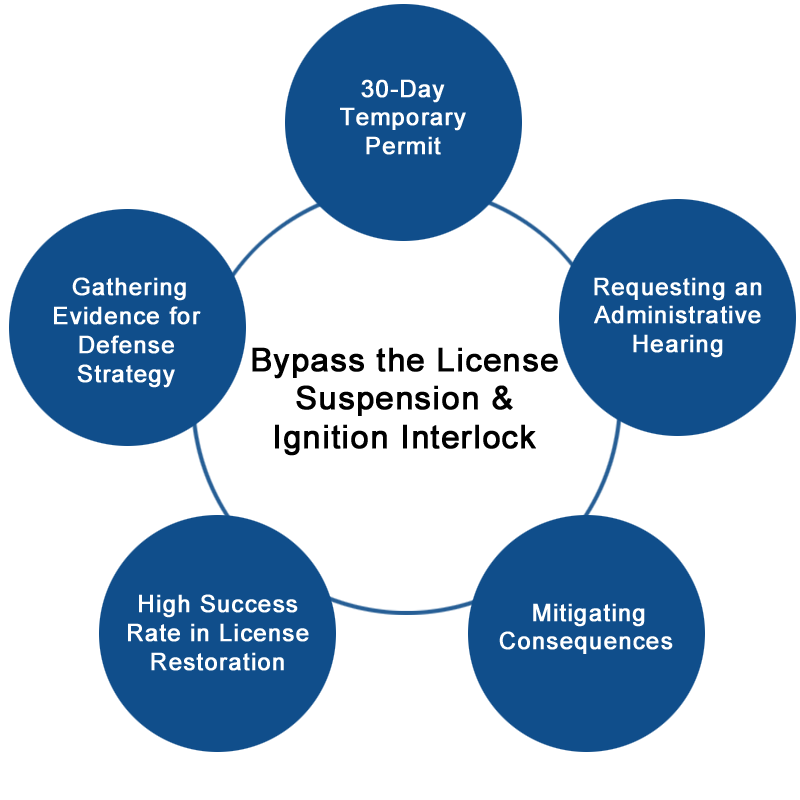 The Legal Bypass to the License Suspension and Ignition Interlock Device
The Legal Bypass to the License Suspension and Ignition Interlock Device
If you refuse the breath test, the officer will usually confiscate your license on the spot, replacing it with a 30-day temporary permit. This suspension can be repealed through an administrative hearing, which you or your attorney must request within 30 days of the initial arrest. This hearing not only provides a valuable avenue for refusing a breath test, but it can also result in you not immediately being required to have an IID in your car. This hearing serves as an effective means to mitigate the consequences of refusing the breath test. Our firm boasts a high success rate in helping clients regain their driving privileges and get their driving privileges restored quickly. Additionally, during this hearing, your attorney will gather crucial information and evidence regarding your current criminal proceedings. This will enable them to devise a robust defense strategy, potentially leading to the reduction or dismissal of your impaired driving charge in the future. If you miss the window for contesting your driver’s license suspension, it can have major implications, so schedule a free case evaluation online or call us at (918) 582-6333 to learn how we can save your driver’s license.
Why Breathalyzer Tests Are Inaccurate
We mentioned earlier several factors that can skew the results of a breathalyzer test, including physical traits and the nature of what you were drinking. But in court, a good attorney can shed light on numerous other factors, including:
Health Issues
Even if you don’t feel sick, a mild illness can cause changes in your body temperature and metabolism that can skew results. In addition, a broad range of maladies including acid reflux, diabetes, asthma, and bronchitis can impact a BAC reading. If you wear dentures, you may show an elevated BAC due to the alcohol trapped in them. If you are on a low-carb diet, the ketones in your breath can mimic alcohol. And if you’re on certain medications, such as cough syrup, you could trigger a false positive.
Contamination and Interference
Mouthwash and breath spray are innocuous on their own, but can register on a breathalyzer test as alcohol. So can certain foods, such as ripe fruits and protein bars. If you vomit or burp shortly before the test, this can elevate BAC readings.
Environmental Factors
Environmental factors can impact testing results as well, whether it be vapors from nearby paint fumes or cleaning fluids, exposure to chemicals on your skin or clothing, or radio interference that affects the equipment.
Issues with Equipment and User Error
Breath tests are required to adhere to strict standards for maintenance and calibration; however, these standards are not always met. Equipment malfunctions or software errors can result in inaccurate readings and false positives. For instance, a breath test that hasn’t been calibrated properly might show a higher blood alcohol concentration than actual. Additionally, although law enforcement officers are trained to operate this equipment, they are also susceptible to human error. A simple mistake, such as not waiting the appropriate amount of time after a suspect has consumed food or drink, can lead to a false reading. Our firm possesses an official breath test machine and recognizes the numerous potential errors it can register. Even if you have tested above the legal limit, false positives for sober drivers are more common than you might expect. Hypothetically, someone eating white bread or soy sauce at dinner could potentially trigger a false positive.
Claiming You Refused the Breath Test
In addition to the breath test not being accurate, many law enforcement officers may claim that you refused the breath test if you remain silent, provide ambiguous answers, use delaying tactics, or fail to complete the test, such as not blowing hard enough or at all. They may also give rapid instructions or use multiple test attempts. Ultimately, your refusal may not be a refusal, and that can also be challenged in court to prove your side of the story.
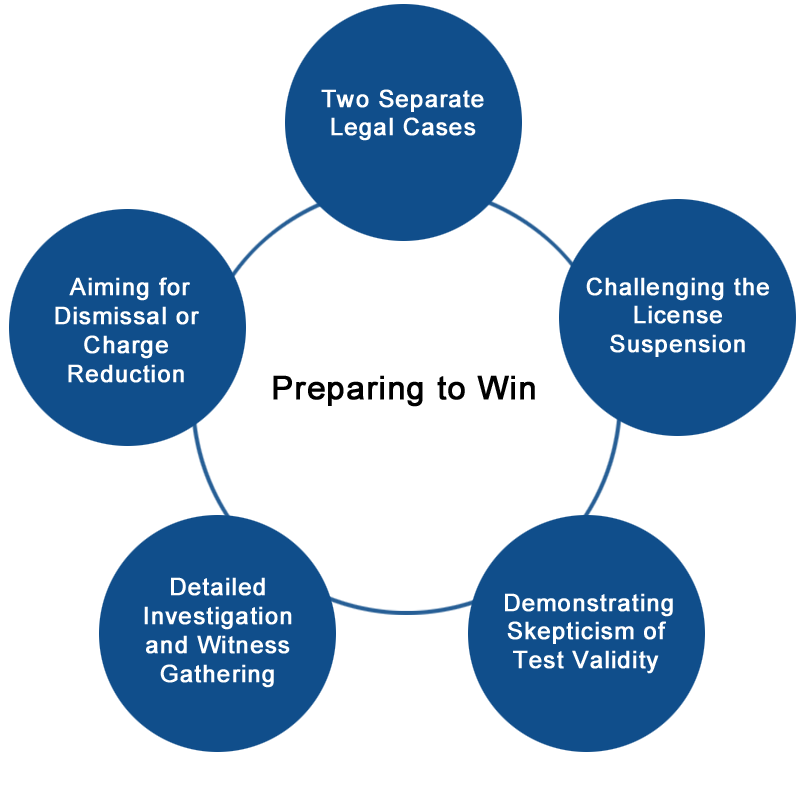 Preparing to Win
Preparing to Win
In Oklahoma, refusing a breath test leads to two separate legal cases against you. The first is a license suspension, and the second is a criminal case. The state often uses fear tactics to coerce citizens into taking the test. Refusing the test can demonstrate your skepticism of the test’s scientific validity and your determination to invoke your rights. Simultaneously, an administrative license hearing allows you to challenge your driver’s suspension on the grounds that there was insufficient evidence in your case and that your driving privileges should be restored. As an empowered and educated citizen, you have the right to refuse the breath test and subsequently challenge the license suspension. The key in both cases is preparation, and that is what The Edge Law Firm does best. Our defense team approaches each case like the most skilled detective, digging up the details that the prosecution and law enforcement missed, finding witnesses that can reinforce your innocence, and challenging every aspect of the prosecution’s case. You don’t have to submit to an inaccurate breath test, and you shouldn’t have to be penalized for it. Whether you refused the test and are being charged with DUI, DWI, or APC, our goal is to provide the best possible outcome for your case, which is usually a dismissal or reduction of charges to a non-DUI disposition and no conviction on your record.
Schedule a Free Case Evaluation
Submit your contact information below to schedule a free, no-obligation case evaluation. Discovering your options can bring clarity to your situation and guide you back to freedom. Knowing there are alternatives will help you sleep better at night.
Please submit our secure contact form below:
